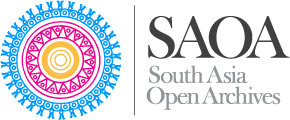The SAOA collection is freely available at: https://www.jstor.org/site/saoa/
The South Asia Open Archives (SAOA), a subset of the South Asia Materials Project (SAMP), creates and maintains a collection of open access materials for the study of South Asia. This major collaborative initiative is aimed at addressing the current scarcity of digital resources pertinent to South Asian studies and at making collections more widely accessible both to North American scholars and to researchers worldwide.
SAOA (formerly SAMP OAI) addresses needs in all academic disciplines, from the humanities through the sciences. With an initial emphasis on colonial-era materials from South Asia, a carefully curated collection of resources will fill gaps in available online collections. Several criteria are used to select and prioritize resources for digitization, including:
- Value to research;
- Utility for a broad population of users;
- Uniqueness (not available through other credible, sustainable sources);
- At risk – due to condition, environmental or sociopolitical factors, or other threats;
- Complementarity to other resources.
Please visit the Statement of Value to learn more about how SAOA provides demonstrable value to its members, partners, and the general public. The SAOA Five-Year Plan (FY21-25) and SAOA reports from 2021 and 2023 provide additional details.
To become a member of SAOA, please submit the Participant Commitment Form to SAOA.
Elements of SAOA governance are to be found in the SAMP Prospectus, Five-Year Plan (linked above), and the Organizational Practices document.
To make a suggestion about content to digitize for inclusion in SAOA, please use this suggestion form.

